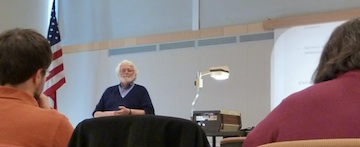We hear complaints about how our government is not entrepreneurial enough, not agile enough; and yet we burden government with the kind of fetters we would not begin to consider for real business. We don’t trust our government to get the job done. This week I was reminded of this distrust in a discussion of “data practices” sponsored by MNCOGI.
I am proud that Minnesota’s data practices act assumes the public has access to public data and forces lawmakers to enact specific exemptions to this presumption as law. This makes it a little more difficult for the government to keep secrets. The presentation by Don Gemberling helped us understand our rights and the government’s responsibilities. For example, you have a right to inspect public government data at reasonable times and places at no cost. The government has a corresponding responsibility to make government data easily accessible and convenient to use. Sound good, right?
But then, one of the panelists at the session, State Senator Warren Limmer, complained that after a three minute wait at a county office he was charged $22 for an aerial photograph of a property he was handling in his real estate business. $22 was way more this “piece of paper” should have cost, he contended. When I pointed out that that cost might easily be justified by the systems required to store and provide quick access to such photos, others in the audience responded that the government must be keeping this data around for its own purposes, we should not be charged for just getting copies for our purposes. And yet, I wonder, as we suck funding out of local government and insist on lower taxes toward state government, how can we at the same time expect services like this with little to no fee? Is $22 really so unreasonable? Isn’t a copy in three minutes flat as service to be commended, not ridiculed?
Another public official on the panel, Rep. Mary Liz Holberg, floated a plan for a state commission to handle the tide of exemption requests that hit legislators with regard to data practices. She complained that these requests boil down to a late-night legislative bartering session where lobbyists are in control because part-time legislators just don’t have the time to become experts in data practices, privacy, and government transparency. A commission could operate year-round, hear requests at reasonable hours, and process recommendations for legislators, and perhaps even make interim findings in certain cases. How would such a commission be funded, asked one participant? Holberg simply said, “well, it would have to be a priority.”
Holberg and Limmer are both part of the new Republican majority in the Minnesota legislature. Here they were both demanding increased government service and responsiveness, but you can bet they won’t be arguing for increased funding to support such initiatives. Why won’t we agree to pay for the services we demand?
Meanwhile, I left the panel with real concerns about the fundamental mission of the Minnesota Government Data Practices Act. While I appreciate the ideal of transparency in government, I also recognize that government has to attract real people to its service and the threat of exposure of every action is chilling to government service. Two of four candidates for the recent University of Minnesota presidency pulled out of the process because they did not consent to the very public interviews that would have been required. State workers who supplement meager state technology offerings with personal equipment (like laptops or phones) then find that equipment could be confiscated as part of public information discovery. Government has to avoid the use of cloud services like Gmail or Flickr because public access rules may not be enforceable. How do we make compliance with requirements for public access to government data something other than a weight that drowns efficient administration?
I don’t have any magic bullet. I am simply very concerned that we are, with the best of intentions, destroying the viability of government to serve the common good. As government becomes less efficient, we complain more about the poor service, and we cut back on funding. It is a vicious cycle that leads nowhere but chaos and corruption. Who is left to roam free in the remains of government dysfunction? Private enterprise. With none of the same restrictions and subject to almost none of the same regulation, private enterprise slowly absorbs formerly public function. Then we are truly left in the dark.
We need to stand up for the good that we can do together, as a public. We must trust our government a little more and private corporations a bit less. I’m not sure how we get there, but if we don’t, we give away our state and our country.

